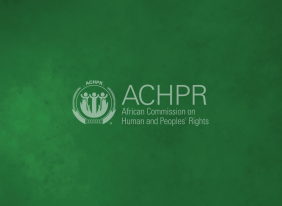The Special Rapporteur on the Rights of Women in Africa, Honourable Commissioner Lucy Asuagbor, on her behalf and of the African Commission on Human and Peoples' Rights (the Commission), is concerned that this period of the COVID-19 pandemic has seen a spike in the violation of women’s rights.It is a standing concern of the Special Rapporteur that women, by virtue of their sex, bear the brunt of any crises and that existing inequalities for women and girls become more pronounced during crises.
In particular, the Special Rapporteur notes with concern the high level of complaints of violence against women, including gender-based violence (GBV) and domestic violence. According to reports, thousands of complaints relating to GBV have been registered in many African countries due to lockdown measures imposed as a response to the COVID-19 pandemic. It is reported thatcalls have tripled from women trapped in their homes with abusive partners.Furthermore,the pandemic has given rise to economic consequences with women increasingly losing their sources of income especially in rural areas. Other challenges that have been registered include limited access to sexual and reproductive health care services; closure of schools, with millions of girls out of school, leading to increased risk of sexual exploitation, early pregnancies, rape, as well as early and forced marriages.
Let us not lose sight of the gains we have achieved over the years. African leaders should seize this opportunity to recognize and reinforce the efforts that have been made in promoting and protecting the rights of women in all spheres of life. Indeed, despite the current crises, 2020 marks several critical milestones. Amongst others, it marks 25 years in the implementation of the Beijing Platform for Action, which remains to date the most comprehensive agenda for gender equality ever agreed. It also marks the end of the African Women's Decade, which was launched by the African Union (AU) in 2010 to re-invigorate commitments to accelerated implementation of agreed global and regional obligations of gender equality and women empowerment in Africa. This decade has seen several advancements in the promotion and protection of women's rights in Africa, including the parity between girls and boys primary school enrolment and the narrowing gap in enrollment across other educational sectors; and a general reduction in maternal mortality and other health-related concerns. Notably, to date, of the fifty-five (55) AU Member States, forty-two (42) have ratified the Protocol to the African Charter on Human and Peoples' Rights on the Rights of Women in Africa (the Maputo Protocol), a quarter of which deposited their instrument of ratification this decade.
Indeed, Article 3 of the Maputo Protocol enjoins State Parties to: "include in their national constitutions and other legislative instruments, if not already done, the principle of equality between women and men and ensure its effective application".
While the Special Rapporteur applauds States’ efforts in protecting the rights of women and girls during this pandemic, she urges States to adopt the principle of equality in all COVID-19 related responses while providing special protection to women and girls through access to sexual and reproductive health services; providing alternative accommodation to victims of GBV, as well as counseling services for women and girls who are victims of GBV; providing support to women who have lost their sources of income, while preempting economic empowerment strategies/plans post COVID-19; and ensuring that women are involved in all Plans and Actions aimed at protecting their rights during and after the pandemic.
The Special Rapporteur underlines the Strategy for Gender Equality and Women's Empowerment which was launched at the AU Summit in February 2019. The Special Rapporteur reiterates that women's access to quality education; guarantees to bodily integrity and security; full ratification and implementation of the Maputo Protocol; and equal representation of women in decision making are crucial to ensuring that women’s rights are truly protected.. We cannot hope to step into the "2063" we strive for if half of the population are made to crawl.
The time to act is now. African leaders should strive to write a positive narrative when this pandemic rolls over. In this regard, the Special Rapporteur would like to remind African leaders of their obligations towards the full realization of women's rights and to encourage them to take concrete steps towards developing gender-responsive approaches to the pandemic so as to effectively address the challenges occasioned by the pandemic.
Banjul, 6 May 2020









